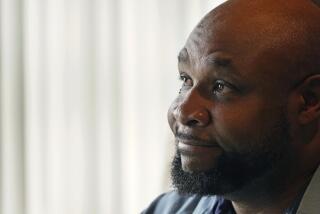Clinton to Discuss Policy With Jackson
LITTLE ROCK, Ark. — After a campaign in which their relationship was marked more by tension than cooperation, President-elect Bill Clinton and the Rev. Jesse Jackson will sit down for breakfast today at the governor’s mansion here to discuss policy and personnel decisions facing the incoming Administration.
Before the breakfast meeting, Clinton will attend services at a Roman Catholic church in Little Rock where Jackson is scheduled to preach.
Jackson’s visit symbolizes the political strains facing Clinton as he tries to assemble a new government: Although he built his campaign around the effort to define a “new” centrist Democratic Party, he won the election largely on the votes of traditional Democrats, such as blacks, union members and liberals. In fact, blacks provided a larger share of Clinton’s votes than they did for Michael S. Dukakis four years ago.
Now Clinton must balance the demands of those supporters with his desire to reach out to the moderates and independents who voted for Ross Perot--and could hold the key to Clinton’s long-term political success.
On Saturday, Clinton spent a quiet day, jogging and golfing through a foggy, rainy morning. He was working inside with Vice President-elect Al Gore and transition director Warren Christopher when the sun broke through in the afternoon.
Also on Saturday, aides announced that Clinton will be in Southern California next weekend, beginning with at least one public appearance Friday in Los Angeles. He will spend most of the weekend in a vacation home south of Santa Barbara owned by television producers Harry and Linda Bloodworth-Thomason, both longtime friends and supporters. He is scheduled to return to Little Rock the following Monday, aides said.
Aides also said Clinton is considering holding at least one televised town meeting before he takes office in January. Spokeswoman Dee Dee Myers said that while no date was scheduled, such an event was “very likely. He will continue to do the kind of direct-access, campaign-style events that he did before he was elected.”
Today’s meeting with Jackson could give Clinton a preview of the pressures he will face from his party’s left ranks as he tries to fulfill his promise to create a “third way” beyond traditional liberalism and conservatism. Since the election, Jackson has repeatedly insisted that progressives must hold Clinton accountable for his more liberal campaign promises--from gay rights to statehood for the District of Columbia.
“Those who voted for him in November cannot just sit back and wait,” Jackson declared in a televised interview with commentator John McLaughlin this weekend. “They must now take the agenda to the courts, to legislatures and to the streets as well.”
Aides said Clinton extended the invitation for the meeting after learning that Jackson was scheduled to preach in Little Rock today. Clinton and Jackson also spoke last week by telephone and at a dinner in Washington hosted by Democratic fund-raiser Pamela Harriman.
Through most of the campaign, Clinton’s relationship with Jackson was roiled by personal and ideological differences. Trying to project a centrist image, the Arkansas governor made little secret of his desire to keep his distance from Jackson and relied instead on other black leaders. Jackson, in turn, left little doubt that he preferred candidates more liberal than Clinton.
In March, Clinton flew into a rage when he was erroneously informed that Jackson had endorsed one of his competitors, Iowa Sen. Tom Harkin. Although the report was incorrect, Jackson did appear in ads for Harkin in the civil rights leader’s home state of South Carolina.
Later, Jackson campaigned with former California Gov. Edmund G. (Jerry) Brown Jr. in New York. He encouraged some of his supporters there to assist Brown’s last-ditch effort to stop Clinton’s nomination.
A more serious breach between the Clinton and Jackson developed in June. Speaking before Jackson’s National Rainbow Coalition in Washington, Clinton criticized as racist published comments by rap singer Sister Souljah, who had appeared before the group the night before. Angered, Jackson said Clinton’s remarks “again exposed a character flaw.”
They patched up their differences enough so that Jackson campaigned for the Democratic ticket in the fall, focusing his efforts on voter registration. But Clinton did not devote as much effort as Dukakis or 1984 Democratic presidential candidate Walter F. Mondale to courting Jackson.
Clinton put much more emphasis on highlighting his support from other black leaders--particularly elected officials such as Democratic Reps. Mike Espy of Mississippi, John Lewis of Georgia and William J. Jefferson of Louisiana--most of whom supported him in the tiff over Sister Souljah.
Jackson, however, will meet with the President-elect before those other black supporters have done so, although some have spoken with Clinton by phone. Clinton aides advise against reading too much into the invitation to Jackson.
“Clinton is a fairly eclectic thinker, and he is open to suggestions from all quarters,” one aide said. “But I’m not sure Clinton will feel particularly compelled, if Jackson makes demands, that he has to meet them.
“He has respect for Jackson,” the aide continued, “he will consider his suggestions, but through the campaign he did work with a whole new generation of black leaders, and his election to some extent gives voice to them.”
More to Read
Get the L.A. Times Politics newsletter
Deeply reported insights into legislation, politics and policy from Sacramento, Washington and beyond. In your inbox three times per week.
You may occasionally receive promotional content from the Los Angeles Times.










